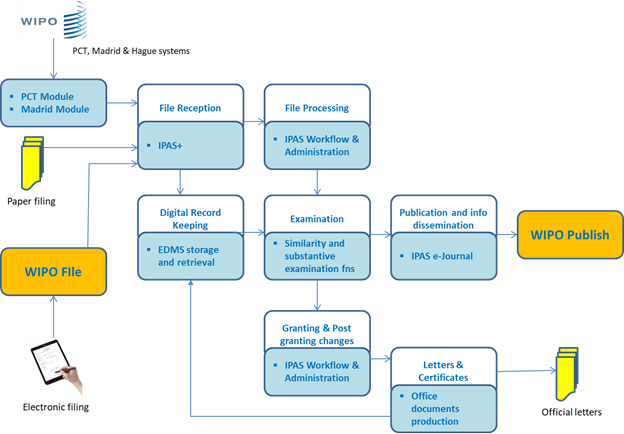Industrial Property Administration System (IPAS) is software developed and owned by the World Intellectual Property Organization (WIPO). The software is offered to Industrial Property Offices (IPOs) in the member states as part of the WIPO technical assistance program to the offices and is delivered under cooperation frameworks that outlines, among other elements, the roles and responsibilities of both WIPO and offices in the provision, hosting and maintenance of the software. It offers the following functionality and features:
- The software is designed for the electronic administration of data, process and documents associated with the registration of Industrial property Applications at the offices with overall objectives to improve operational efficiencies and quality of services offered to customers. The software supports the three basic industrial property rights; Patents, Trademarks and Designs, facilitating IPOs establishing their national IP electronic registries.
- It offers IPOs end-to-end solution to automate the entire registration process of Industrial Property applications, from filing up to the grant of rights, including formalities, examination, publications in addition to post granting actions such as amendments, assignments and licenses. This powered by the instant generation of letters and certificates at the various steps of the process.
- IPAS is a workflow-based system that reflects the business of the IPOs and is fully customizable in this respect to cope with offices national norms and regulations, including procedures, letters, certificates and publications. The graphical customization tools make tailoring of the software an easy and flexible activity that can be eventually carried out by offices themselves.
- Similarity search functionality come on the top distinguished features offered by IPAS to support examiners’ work on textual and visual marks and designs, thanks to extensive bibliographic search on various fields combination, phonetic search with relevance weighting as well as the native support of Vienna and Locarno classifications used to compare visual logos, designs and objects.
- On the documents side, the system enables the digitization, classification and storage of documents associated with initial or post-filing applications into the database using its Electronic Document Management System (EDMS) module. Built on Solr technologies and offered as an optional module, the EDMS is an integral part of IPAS and is designed to streamline the retrieval of electronic version of the documents directly in IPAS and along with the processing of the applications on the system.
- The software comes in line with IP standards and classifications and further help member states improving their communication with WIPO global administrated systems. IPOs member of the Patent Cooperation Treaty (PCT) for instance will find relevant automation component in IPAS to support the electronic reception of PCT applications from WIPO thus streamlining application administration on IPAS once PCT applications enter into national phase in the country. A similar benefit is realized with members of Madrid System.
- IPAS offers extended privileges scheme that enables offices to customize the different roles and access rights on modules, actions and user interface. It is also equipped with audit function to help management monitoring changes taking effect on the electronic registry and the general user behavior on the system.
- With its 3-tier architecture built on Java J2EE technologies, the software is scalable from small IPOs with few hundred records registry, typically run on simple one-box hardware, all the way to medium-to-large IP institutes maintaining millions of IP records and running on complex servers’ grid and data storages. The software is compatible with both Oracle and MSSQL databases for its database layer and soon will offer the option of open source database to member states.
- The system is shipped with rich set of APIs that encapsulates literally all business functions of IPAS to facilitate the interface and communicate with 3rd party local systems and services such as national commercial registration system or custom online filing service.
